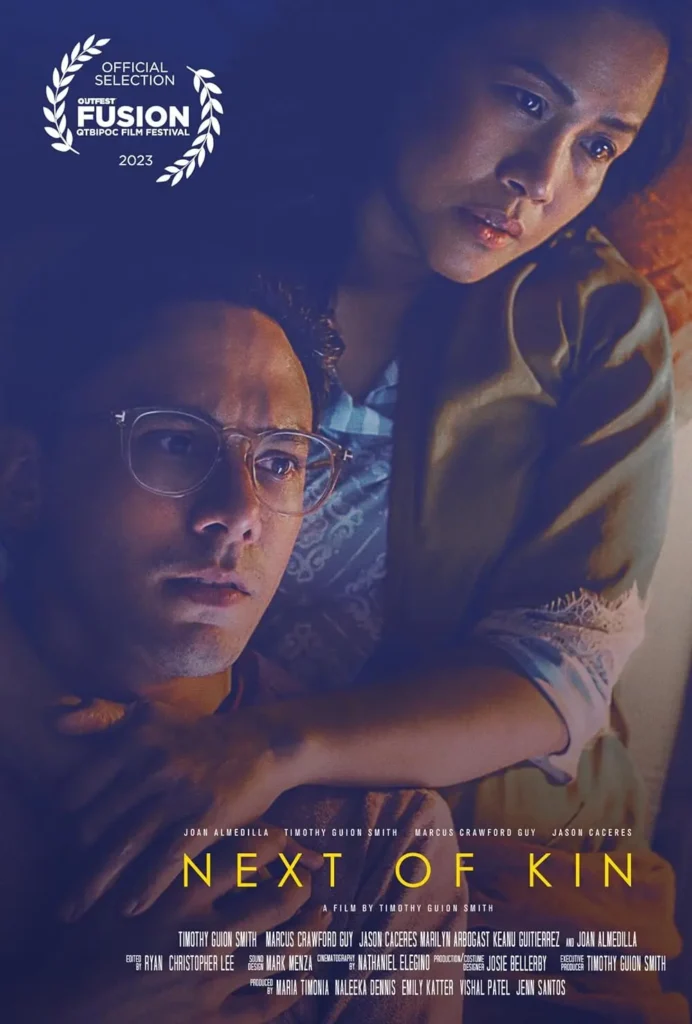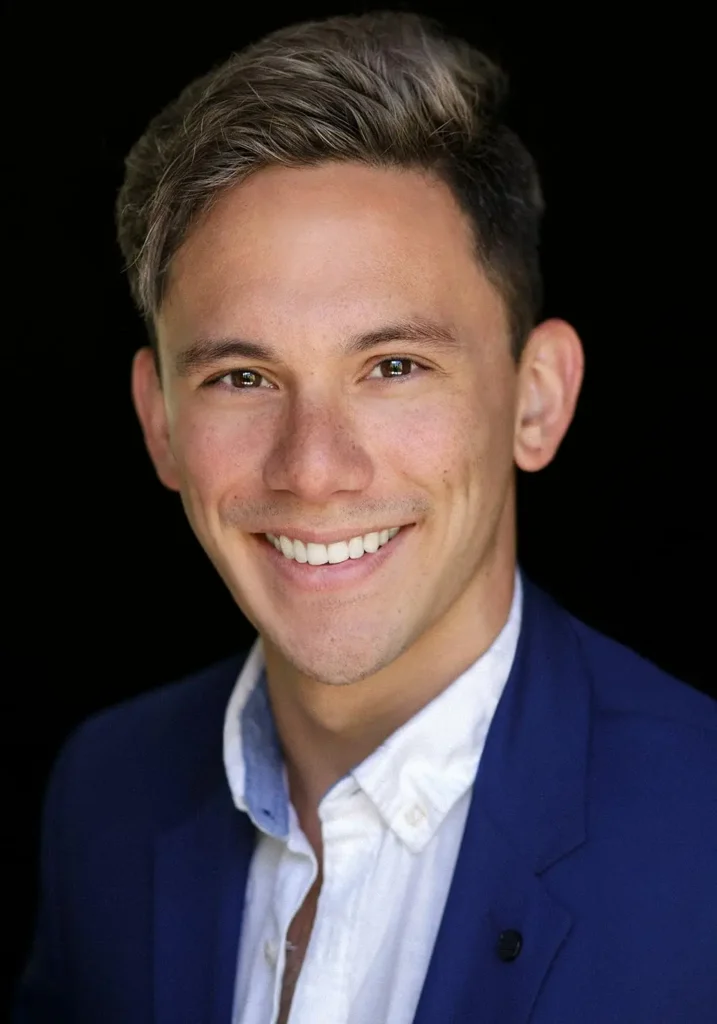Confronting and combatting deeply-rooted stigmas, particularly within the LGBTQ+ and AAPI communities is challenging, but crucial. Acclaimed filmmaker Timothy Guion Smith masterfully approaches such generational and cultural complexities of living with HIV/AIDS while being Filipino in his trailblazing short film, “Next of Kin,” which follows his captivating performance after a painful rejection alongside Joan Almedilla as his also HIV positive mother.
Elevated with his heartfelt portrayal, Timothy’s poignant narrative offers a brief, but tender and nuanced look into the dynamics that come with navigating these layered identities, and the discussions it takes to battle their associated prejudices.
Timothy’s pioneering film was met with a tremendously overwhelming response at San Francisco’s CAAMFest 2024, and we had the amazing opportunity to chat with him on what the impact of “Next of Kin” means for the future of intersectional queer AAPI cinema, for overcoming stigmas, and for its significance in encouraging such constructive cultural conversations.

Hello! Thank you so much for speaking with us. Firstly, how important was it for you to tell this narrative? In what ways do you hope this film will contribute to the broader conversation about LGBTQ+ rights and HIV/AIDS visibility within the Filipino/AAPI community in regards to also eliminating stigmas?
While preparing for the Q&A sessions following our screenings, I researched how HIV/AIDS affected the Filipino-American community and the Philippines at large. It was sobering and alarming to learn that earlier in the 2000s in the state of California, Filipinos had the highest percentage of HIV/ AIDS cases amongst the AAPI community at 32.4 %, followed by Chinese Americans in a distant second at 14.3% (NYU’s Community Health Needs & Resource Assessment: An Exploratory Study of Fil-Ams). According to the United States National Center for Biotechnology information (NCBI), in the last decade, between 2012 to 2023, as HIV/AIDS-related deaths and cases declined globally, the Philippines reported a surge in new cases. It was even more devastating to learn that a third of newly diagnosed cases met the clinical symptoms criteria for advanced HIV disease, symptoms that have been preventable since life-saving treatment became accessible in 1996.
Suffice to say, the Fil-Am and Filipino communities are disproportionately affected by HIV/AIDs and the panacea to combat its harmful manifestations is doing what we can to continue the HIV/AIDS conversation and eliminate stigma. I like to think NEXT OF KIN team’s short film is my little bit of activism to receive the baton of activists before me and do my part–by being open about my own HIV + status, alleviating the concerns of those whose family members are positive, and challenges those also living with HIV/AIDS/ stigma presents today.
This was something that Joan Almedilla, the exquisite actor who played my mother, was equally passionate about. She loved the script and shared with me an experience she had from when she was playing Fantine on the Les Miz tour. She visited an orphanage and spent an afternoon with kids whose parents had HIV/AIDS.

And so can you discuss how Filipino cultural values and family dynamics are approached and portrayed in the film, especially in relation to the mother-son relationship?
I drew upon the close-knit nature of my mother (who hails from Iloilo, emigrated from Manila to NYC in 1981) and our loving family. Being close-knit, not being on speaking terms because of painful choices, and unconditional generational love, although universal familial traits, were specifically drawn from common threads and patterns I’ve recognized over the years from my my mother’s side of the family (my father is Irish American) as well as the experience of my fellow Filipino American friends I’ve made throughout my life– be it in LA, NYC, college, high school, and grade school.
What significant reactions or feedback have you received from the Filipino and queer communities since the film’s release?
Each in-person screening has been meaningful and special. At the San Diego Filipino Film Festival, I was seated behind two rows of high school students who were attending the festival because their Fil-Am dance team sponsored it. Seeing the film through their eyes as first time audience members–hearing their gasps, and glances at each other in between certain lines and shots, is an experience I won’t soon forget.
The following month at San Diego Asian Film Festival, it was rewarding having my mother and my second cousin Jessica (we share the same close bond her mother and mine have since they were raised together in Iloilo) be there and seeing all the audience members come up to them post-screening to congratulate them and say how proud they must be of me.
My mom and Jessica have been my ardent supporters and cheerleaders since I’ve been chasing acting and filmmaking since the mid-2000s and for them to attend a screening and meet and speak with others impacted by my work, was an unexpected and splendid new family bonding experience!

What future projects or themes are you interested in exploring, especially in relation to LGBTQ+ and AAPI narratives?
Thinking of the series and features I’m currently writing, you could say theme-wise, I am drawn to stories of family ties where families uplift and challenge each other, seeing dreams through to becoming reality, characters digging deep in extraordinary circumstances, and reckoning what it means to be living in a time where blatant anti-LGBTQ equality, misogyny/ anti-women’s healthcare, and racism, are central tenets of the chaotic Far Right, GOP platform.
Lastly how did it feel to present your film in San Francisco, a historic city rich with AAPI and queer history?
Screening in San Francisco at CAAMFest 2024 was thrilling, heartening, and inspiring. Many LGBTQ modern civil rights can trace their origins back to San Francisco. Having attended Pride in NYC, LA, and SF over the years, part of me feels I didn’t truly feel the American historical and cultural significance of Pride until I marched in San Francisco with Equality California in 2017.
Pairing that with the role San Francisco has played in AAPI history, I made sure to take a moment to be present and thankful that my first short film that I directed, acted, wrote, and produced, was granted the chance to screen in a city I find to be so meaningful. To that extent, I am forever grateful to the CAAMFest Programming Team members Del Holton and Thuy Tran, for giving our film a platform to screen directly in-person for the SF/ Bay Area community.
Thank you for your thoughtful and thorough responses, we can’t wait to see what your next endeavors are!
You can learn more about “Next of Kin” here.
This interview has been edited and condensed for clarity.
































